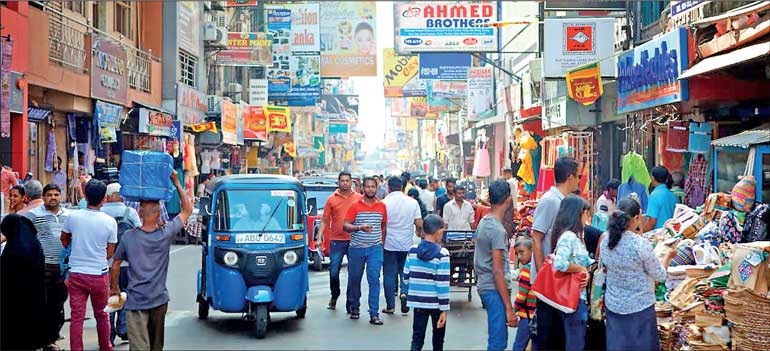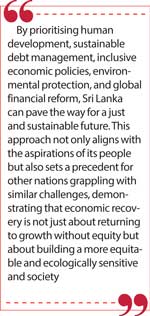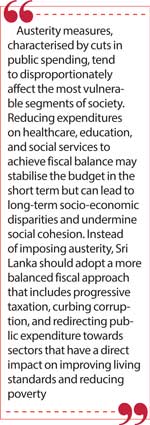Monday Feb 16, 2026
Monday Feb 16, 2026
Thursday, 5 September 2024 00:20 - - {{hitsCtrl.values.hits}}

Economic policies should prioritise human development over market efficiency
 On 12 April 2022, Sri Lanka took the unprecedented step of announcing a pre-emptive sovereign default on its foreign debt, totalling approximately $ 50 billion. This decision, plunged the country into a deep economic and growth crisis. The economic repercussions were swift and severe: a -7.8% contraction in GDP, end-of-year inflation surging to 54.5%, and a dramatic increase in poverty levels, with 25% of the population now living below the $ 3.65 poverty line.
On 12 April 2022, Sri Lanka took the unprecedented step of announcing a pre-emptive sovereign default on its foreign debt, totalling approximately $ 50 billion. This decision, plunged the country into a deep economic and growth crisis. The economic repercussions were swift and severe: a -7.8% contraction in GDP, end-of-year inflation surging to 54.5%, and a dramatic increase in poverty levels, with 25% of the population now living below the $ 3.65 poverty line.
The crisis laid bare the vulnerabilities of Sri Lanka’s economic framework, prompting scholars and international experts to propose a range of solutions aimed at stabilising the economy and charting a path toward growth. One such proposal written as a series of essays in “Sri Lanka: from debt default to transformative growth” published by UK think-tank Overseas Development Institute (ODI), while pragmatic on the surface, fails to address the root causes of Sri Lanka’s economic challenges and overlook the importance of prioritising the wellbeing of its people and the environment.
A critique of the ODI proposals
The essence of the 27 proposed measures revolves around stabilising the economy through structural reforms, debt management, and increased trade liberalisation. While these recommendations may seem to offer short-term economic stabilisation, they fall short of addressing the systemic issues that have led to Sri Lanka’s economic distress. Moreover, they risk perpetuating an unjust global financial architecture that prioritises the interests of international creditors and investors over the socio-economic well-being of Sri Lanka’s citizens.
1. Cross-party consensus and economic vision: A misaligned focus
The call for building a cross-party consensus on economic direction is commendable. A unified approach that involves political parties, businesses, trade unions, and civil society is crucial for sustained recovery. However, the emphasis on maintaining trade openness and creating a level playing field for investors aligns with neoliberal ideals that prioritise market efficiency and investor confidence over social equity and environmental sustainability. It downplays that other political parties may bring different social, political and economic priorities to the table. Cross-party consensus needs to acknowledge political differences and work to compromise and align along common lines.
Specifically, the focus on trade openness without robust protections for local industries and workers risks creating an environment where profit motives supersede the needs of the population. This approach can lead to a race to the bottom, where labour rights, environmental standards, and social protections are compromised to protect and promote competitiveness. For a genuine and sustainable recovery, economic policies must prioritise human development and ecological threats, ensuring that the benefits of growth are equitably distributed and that the environment is safeguarded for future generations.
2. Debt sustainability: A band-aid on a deep wound
 The proposals to implement the Public Debt Management Act and pursue active debt management signify an attempt to shift Sri Lanka’s approach from a loan-dependent model to one that monitors and mitigates debt risks. However, these measures do not address the structural causes of Sri Lanka’s debt accumulation, nor do they challenge the injustices of the global financial system that have contributed to the country’s indebtedness.
The proposals to implement the Public Debt Management Act and pursue active debt management signify an attempt to shift Sri Lanka’s approach from a loan-dependent model to one that monitors and mitigates debt risks. However, these measures do not address the structural causes of Sri Lanka’s debt accumulation, nor do they challenge the injustices of the global financial system that have contributed to the country’s indebtedness.
The notion of borrowing from the cheapest lender, irrespective of diplomatic relations, underscores a purely financial view of debt management that neglects the broader socio-political or geopolitical implications of foreign debt. This approach may lead to short-term fiscal relief but could lock Sri Lanka into long-term dependencies and influence by external powers. Furthermore, the idea of using a “sustainable brand” to secure better borrowing terms risks becoming a greenwashing exercise unless there are concrete measures to ensure that such funds are genuinely directed towards sustainable and socially beneficial projects.
3.Central Bank independence: A narrow focus on inflation
Enhancing the Central Bank’s independence and adopting a flexible inflation-targeting regime reflects a conventional neoliberal stance that prioritises price stability above all else. While controlling inflation is vital, especially in a crisis-ridden economy, an excessive focus on inflation targeting can lead to policies that stifle growth and exacerbate unemployment. This narrow focus neglects other critical macroeconomic objectives such as employment generation, income redistribution, and sustainable development.
The Central Bank’s policy framework should be broadened to encompass a dual mandate that balances price stability with the need to support economic growth and job creation at living wages. By adopting a more inclusive approach, the Central Bank can contribute to a recovery that benefits a wider cross-section of society, rather than catering solely to the interests of financial markets.
The IMF Extended Fund Facility agreement stipulated an independent Sri Lanka Central Bank (CBSL) with inadequate democratic oversight, that can no longer finance the Government to repay its rupee debts. The IMF expects the Government to raise funding from money markets by imposing certain limitations on the domestic debt expansion of the country.
4. Fiscal sustainability: The perils of austerity
The push for fiscal sustainability through transparency, discipline, and the rationalisation of state-owned enterprises (SOEs) mirrors typical neoliberal prescriptions that often result in austerity measures and privatisation. While improving governance and efficiency in SOEs is necessary, the blanket application of these principles can lead to outcomes that are detrimental to public welfare.
Austerity measures, characterised by cuts in public spending, tend to disproportionately affect the most vulnerable segments of society. Reducing expenditures on healthcare, education, and social services to achieve fiscal balance may stabilise the budget in the short term but can lead to long-term socio-economic disparities and undermine social cohesion. Instead of imposing austerity, Sri Lanka should adopt a more balanced fiscal approach that includes progressive taxation, curbing corruption, and redirecting public expenditure towards sectors that have a direct impact on improving living standards and reducing poverty.
5. Economic transformation: The risk of over-liberalisation
The proposals to undertake “stroke-of-the-pen” reforms to cut regulations for investors and fast-track free trade agreements (FTAs) highlight a commitment to economic liberalisation. While reducing bureaucratic red tape can improve the ease of doing business, a wholesale deregulation approach risks undermining labour rights, environmental protections, and consumer standards.
Sri Lanka should be cautious in entering into FTAs that could limit its policy space and sovereignty. Trade agreements should be carefully negotiated to ensure they do not undermine local industries or lock the country into unfavourable terms that could hinder future economic diversification. Economic transformation should be aligned with sustainable development goals, focusing on sectors that can provide long-term growth, such as renewable energy, technology, and sustainable agriculture.
6. Inclusive growth and food security: The need for structural change
 The measures aimed at improving food security through the liberalisation of food imports and better storage systems in rural areas fail to address the root causes of food insecurity. Liberalising food imports can harm local farmers and increase dependence on global markets, making Sri Lanka vulnerable to international price fluctuations and supply chain disruptions.
The measures aimed at improving food security through the liberalisation of food imports and better storage systems in rural areas fail to address the root causes of food insecurity. Liberalising food imports can harm local farmers and increase dependence on global markets, making Sri Lanka vulnerable to international price fluctuations and supply chain disruptions.
A more sustainable approach to food security would involve supporting local agriculture, promoting sustainable farming practices, and investing in rural infrastructure. By empowering local farmers and ensuring that agricultural policies are geared towards food sovereignty, Sri Lanka can build a resilient food system that can withstand external shocks and provide for its population’s nutritional needs.
The unjust nature of the global financial architecture
The overarching theme of the neoliberal proposals is their alignment with the existing global financial architecture, which is fundamentally unjust and skewed in favour of developed nations and multinational corporations. The reliance on IMF programs and the prioritisation of debt repayment over social spending are indicative of a system that values financial stability over human development.
The global financial system, dominated by institutions like the IMF and World Bank, has historically imposed austerity measures on developing countries, often leading to socio-economic disparities and political instability. The conditions attached to financial assistance programs typically require countries to implement policies that favour creditors, sometimes at the expense of the wellbeing of their citizens. This creates a cycle of dependency and subordination, where countries like Sri Lanka are perpetually indebted and beholden to external powers.
Alternative pathways for Sri Lanka’s recovery
To break free from the constraints of the neoliberal framework and the unjust global financial architecture, Sri Lanka needs to chart a different course—one that places the wellbeing of its people and the environment at the heart of its economic policies. The following alternative suggestions can serve as guiding principles for a more just and sustainable recovery:
1. Human-centric development:
Economic policies should prioritise human development over market efficiency. This means investing in healthcare, education, and social protection systems to improve living standards and reduce both absolute and relative inequality. A human-centric approach would ensure that economic growth translates into tangible benefits for all citizens, rather than being concentrated in the hands of a few.
2. Sustainable debt management:
Sri Lanka should explore debt restructuring options that align with its long-term development goals. This could include advocating for loss and damage reparation payments, where funds can be redirected towards environmental conservation and climate projects. By linking debt management with sustainable development, Sri Lanka can address its fiscal challenges while contributing to the wellbeing of the local environment.
According to Professor Jayati Ghosh, professor of economics at the University of Massachusetts at Amherst, while debt-for-nature swaps imply debt reduction, they “are far too small to have any impact at all” on countries’ debt. Sometimes, she says, swaps are not even a reduction, but instead allow countries some leeway in rescheduling their debt payments. Ghosh adds: “It’s not even rearranging the deck chairs on the Titanic. It’s pretending to rearrange the deck chairs on the Titanic, with big creditor countries refusing to really make the kinds of interventions that would make a difference in reducing the sovereign debt while pretending to do something about climate and conservation finance. And they’re not.”
3. Inclusive economic policies:
Economic policies should be inclusive, promoting the growth of small and medium enterprises (SMEs), cooperatives, and social enterprises that create jobs and value within local communities. Sri Lanka should focus on developing industries that have the potential for sustainable growth, such as renewable energy, organic agriculture, and eco-tourism, ensuring that economic diversification is aligned with sustainability.
4. Environmental protection and climate resilience:
Environmental sustainability should be a cornerstone of Sri Lanka’s recovery strategy. This involves implementing policies that promote sustainable land use, protect natural resources, and reduce carbon emissions. Investment in renewable energy infrastructure, sustainable transportation, and climate-resilient agriculture can help build a green economy that supports long-term sustainability.
5. Reforming global financial institutions:
Sri Lanka, along with other developing countries, should advocate for reforms in the global financial architecture to create a fair and just system that supports sustainable development. This includes pushing for changes in the way international financial institutions operate, and ensuring that their programs are aligned with the social and environmental objectives of developing nations. Sri Lanka could work with other countries to form alliances and advocate for debt relief, fair trade practices, and financial regulations that protect the interests of vulnerable populations.
Paving the way for a just and sustainable future
Sri Lanka’s economic crisis presents an opportunity to rethink its development model and challenge the injustices of the global financial architecture. While the neoliberal proposals may offer a pathway to stabilisation – although the long-term evidence is moot elsewhere as Peter Doyle – former IMF official – points out. He notes for Jamaica, how the IMF programs fall short of providing a comprehensive solution that addresses the root causes of the crisis, and the resultant stagnation means that this is emphatically not an example for the world to emulate. The same may hold for Sri Lanka.
By prioritising human development, sustainable debt management, inclusive economic policies, environmental protection, and global financial reform, Sri Lanka can pave the way for a just and sustainable future. This approach not only aligns with the aspirations of its people but also sets a precedent for other nations grappling with similar challenges, demonstrating that economic recovery is not just about returning to growth without equity but about building a more equitable and ecologically sensitive and society.
References:
1. Wignaraja, G. and te Velde, D.W. (2024) Sri Lanka: from debt default to transformative growth. ODI Essays. London: ODI
2. IMF, World Bank, and other financial institution reports on Sri Lanka’s economic crisis.
3. Stiglitz, J. (2002). Globalization and its Discontents. New York: W.W. Norton & Company.
4. Dreher, A. (2006). Does the IMF influence fiscal and monetary policy?. Journal of Policy Modeling, 28(2).
5. Raworth, K. (2017). Doughnut Economics: Seven Ways to Think Like a 21st-Century Economist. Random House.
6. Professor Jayati Ghosh et al. (2024). Q&A: Can debt-for-nature ‘swaps’ help tackle biodiversity loss and climate change? Climate Brief.
7. Doyle, P. (2024). Letter: Why Jamaica’s fiscal consolidation was the wrong choice. 12 April 2024. Financial Times.
(The writer is a co-founder of the Institute of Political Economy (www.ipe-sl.org) and a former elected Local Councillor for London in the United Kingdom. He could be reached via email [email protected].)